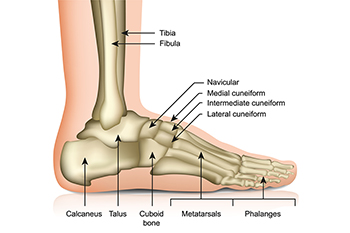
Stress fractures are hairline cracks in bones caused by repetitive stress rather than a sudden injury. Stress fractures, which are common among runners and athletes like basketball players, frequently affect the metatarsals, heel bone, and other weight-bearing bones in the foot and ankle. Symptoms of stress fractures usually start as mild pain during activity and gradually worsen, potentially leading to discomfort, even at rest. Contributing factors include sudden increases in activity levels, wearing improper footwear, or poor bone health. A podiatrist can diagnose stress fractures through imaging tests like MRI scans, as they are difficult to detect with X-rays. Treatment often involves using a walking boot or cast to immobilize the area and allow the bone to heal. In some cases, crutches may be necessary to reduce weight-bearing. A podiatrist can provide guidance on preventing future fractures by addressing footwear, activity modification, and proper nutrition for bone health. If you have foot pain caused by stress fractures, it is suggested that you schedule an appointment with a podiatrist for an exam and treatment.
Stress fractures occur when there is a tiny crack within a bone. To learn more, contact one of our podiatrists from Premier Ankle & Foot Specialists. Our doctors can provide the care you need to keep you pain free and on your feet.
How Are They Caused?
Stress fractures are the result of repetitive force being placed on the bone. Since the lower leg and feet often carry most of the body’s weight, stress fractures are likely to occur in these areas. If you rush into a new exercise, you are more likely to develop a stress fracture since you are starting too much, too soon. Pain resulting from stress fractures may go unnoticed at first, however it may start to worsen over time.
Risk Factors
- Gender – They are more commonly found in women compared to men.
- Foot Problems – People with unusual arches in their feet are more likely to develop stress fractures.
- Certain Sports – Dancers, gymnasts, tennis players, runners, and basketball players are more likely to develop stress fractures.
- Lack of Nutrients – A lack of vitamin D and calcium may weaken the bones and make you more prone to stress fractures
- Weak Bones – Osteoporosis can weaken the bones therefore resulting in stress fractures
Stress fractures do not always heal properly, so it is important that you seek help from a podiatrist if you suspect you may have one. Ignoring your stress fracture may cause it to worsen, and you may develop chronic pain as well as additional fractures.
If you have any questions, please feel free to contact our offices located in South York, West York, and East York, PA . We offer the newest diagnostic and treatment technologies for all your foot care needs.
